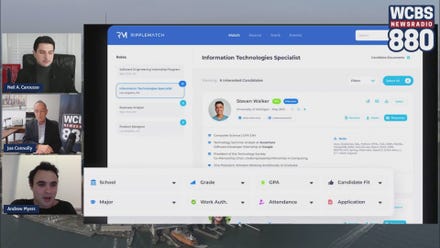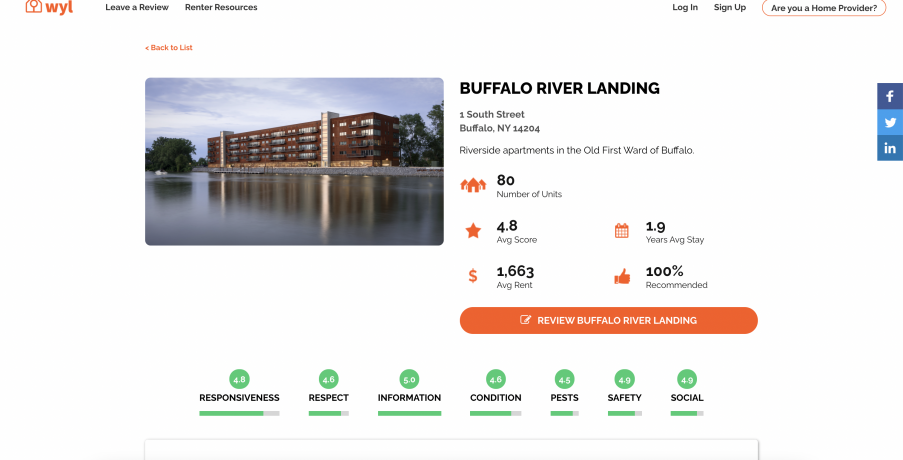
-
Electric vehicles are coming soon. Here’s what it means for the future of driving.
Post Views: 512By Joe Connolly and Neil A. Carousso
DEEP RIVER, C.T. (WCBS 880) — The Biden Administration has set an aggressive target of 50% electric vehicle sales by 2030. That has car companies scrambling to meet demand and build the charging infrastructure necessary to handle this rapid adoption.
Viking Equipment of Deep River, C.T. primarily serves car dealerships and repair shops. When it became clear EVs were the future of his industry, owner and president Joe Shomberg shifted his team’s focus to where business is heading.
“Keep up or get out of business,” Shomberg said of his business philosophy on the WCBS Small Business Spotlight, sponsored by Dime Community Bank.
“The same way it’s going to affect my customers’ business and that they’re not going to do oil changes anymore, I can’t sell them the equipment to do oil changes anymore. So, I need to grow where they’re going to grow and that’s my plan.”
He estimates over 100 electric car models on the market by 2025.
Viking Equipment is now installing three levels of EV chargers for homes, dealerships and gas stations across the country. Level one chargers, Shomberg explained, are 10 volt chargers for the home that are adequate for slow charging and local driving, but it could take days to fully charge an EV. Level two chargers are 220 volts and provide a full charge within hours. Level three chargers are D.C. power units for gas stations and rest stops where drivers can get a recharge within 10-20 minutes.
“The vast majority of the charging is going to be at your house,” said Shomberg. “You’re going to come home at the end of the day, you’re going to plug your car in, and in the morning, it’s fully charged and ready to go.”
He said level two chargers cost $400 to $500, but it will cost extra for an electrician to install the unit.
“Depending on what state you live in, there are incentives both from the federal government and from your electric company to put these chargers in that can cover the cost either all of or part of the cost to purchase the charger, and all of or part of the cost to install the charger.”
Shomberg said his company is also redesigning dealerships with new car lifts to accommodate EV chargers.
He even purchased an electric vehicle for himself so he can experience the issues and limitations of EVs first-hand.
“For the month of August, I drove it exclusively,” Shomberg told WCBS 880. “I had exactly one time that I visited a fast charger, a level three charger. Other than that, all of my charging was either at home or I have a charger at work and I charge it at work.”
One week in September, he switched back to his gas-powered car and found himself at a gas station three times within the week.
“A battery electric vehicle actually got (sic) a lot of advantages to your lifestyle,” said Shomberg.
He believes EVs will likely replace hybrid cars in the future.
“The biggest issue is this range anxiety that people need to overcome,” Shomberg said, affirming that a fully charged EV can travel from the New York Metropolitan Area to Maine without needing a boost.
There are also mobile applications such as PlugShare, which has a map of more than 610,000 EV charging stations where you can plug-in. Other apps calculate the distance one can travel before needing a recharge.
See more on the rapid adoption of electric vehicles, EV charging, and how life and business will change on the WCBS Small Business Spotlight video above.
-
Former ABC President Launches MOJO Sports App to Return Fun to Youth Athletics
Post Views: 536By Joe Connolly and Neil A. Carousso
NEW YORK (WCBS 880) — MOJO Sports is on a mission to keep youth sports fun.
The company was founded by Ben Sherwood, former Disney-ABC Television Group and ABC News president, who witnessed first-hand how youth sports can be stressful for both kids and parents. For 14 years, he was the soccer coach for his two sons. He often took calls on the practice field from then-Disney CEO Bob Iger while trying to organize drills.
“I had a PDF from 1994 for a soccer team and a book called ‘Soccer for Dummies’ that I bought at Barnes & Noble – when there used to be these bookstores where you could buy a book – and I did the best I could. And Lord knows I probably messed up a bunch of soccer careers, because I really didn’t have any idea what I was doing,” said Sherwood on the WCBS Small Business Spotlight, sponsored by Dime Community Bank.
He started MOJO Sports to put the fun back in youth sports, citing research that roughly 70 percent of kids dropout of organized athletics by the age of 13 because it wasn’t enjoyable anymore.
“We set out with MOJO to make sports more fun for kids, easier for coaches and stress-free for parents,” said Sherwood. “And so if you can take the stress and the pressure of all that out of the equation, you have more chance(s) of families participating and kids considering the play.”
He told WCBS 880 the app already has 100,000 monthly active users since its launch in February 2021. It provides training resources and short videos of practice drills.
“Our machine generates a practice for you that fits the exact amount of time you’ve got, it tells you exactly the equipment you’re going to need, and then, gives you high-quality videos that are about a minute to a minute and a half long that show you the activities that you’re going to do in the order you’re going to do them with coaching tips and coaching points,” he said.
“All of these activities are age appropriate, developmentally appropriate for your team, and they’ve been vetted and approved by the best organizations in sports.”
MOJO Sports has partnered with Major League Baseball, NFL Flag Football and Jr. NBA to develop the curriculum. Sherwood told the WCBS Small Business Spotlight that the professional sports leagues recognize the connection between fandom and playing the sport growing up. It is also their talent pipeline.
The MOJO Sports app, available on iOS and Android, is free for coaches and youth sports teams, but parents can buy additional resources with a subscription.
“There’s additional content that families can purchase for a subscription fee of about five bucks a month or about 60 bucks a year,” said Sherwood, continuing, “With that additional subscription fee, you get access to additional content that you can work on at home with your kids if you want to give your kids additional benefits and additional video and additional content to help them get better at sports.”
See how the MOJO Sports app works to keep kids engaged and take the pressure off parent coaches on the Small Business Spotlight video above.
-
Bronx Restaurant Grows Revenue during Pandemic after Key Improvement
Post Views: 540By Joe Connolly and Neil A. Carousso
NEW YORK (WCBS 880) — Richard Berroa is taking back control from delivery apps that cut into his profit using his own newly-optimized website, which has opened the door to entirely new revenue streams while restaurants like his have suffered numerous setbacks in the recovery from the COVID-19 pandemic.
Berroa is an FDNY paramedic who opened Claudy’s Kitchen, a Peruvian restaurant in the Bronx, with his wife Claudia in June 2020.
“We knew that we’d be mostly takeout,” he said on the WCBS Small Business Spotlight, sponsored by Dime Community Bank.
But, the website Berroa first created on his own did not meet today’s demands for online ordering. The Bronx Chamber of Commerce connected Claudy’s Kitchen with the Small Business Resource Network – a public-private partnership created during the pandemic to help small businesses with digital marketing and technology resources and training.
“Having the third parties did help us survive and move forward, but you know, we’ve gotten past that stage and now we want to keep more of the share,” said Berroa.
BentoBox specializes in developing websites and digital ordering systems for restaurants while allowing establishments ownership of customer data for marketing, unlike the third-party apps. The company overhauled the website for Claudy’s Kitchen with the goal of matching the customer experience online with the quality of service patrons expect in-person.
“We really have their whole digital storefront available to them, so that’s become increasingly important through COVID,” said BentoBox chief marketing officer Darcy Kurtz. “I think kind of the post-COVID modern restaurant is going to really have to have all this digital property in place because consumer behavior is just permanently changed at this point.”
She told WCBS 880 that 77 percent of diners go online before heading to a restaurant.
“There was a very real concern that technology impeded their most important thing, which was delivering hospitality,” Kurtz said, continuing, “Hospitality at its roots is about relationships. It’s about being in-person. But, what we found is that technology actually can enhance hospitality. It doesn’t have to be a barrier to (it).”
“The big thing is that we’re getting more in-house orders,” said Berroa. “I see the Grubhub and the Uber orders dipping down while our in-house Bento(Box) is going up. So, so far it’s working.”
BentoBox’s technology also allows restaurants to upsell and cross-sell customers at checkout in a way that adds value to the customer experience. As a result, Berroa said, Claudy’s Kitchen is getting more combination orders that increase the average per ticket.
“If you’ve done it lately, you will see things like, ‘Hey, you bought the hamburger. Are you sure you don’t want fries?’ Some of the things that happen naturally in-person when you go to a restaurant, you want your online experience to be able to help do that so that your online ordering is equal or higher total ticket prices than your dine-in. You don’t want that to be some trade-off that you’re having to make,” said Kurtz.
Claudy’s Kitchen also has a section for events that BentoBox sees as one of many incremental revenue streams that can hedge against COVID surges.
“You’ve got to find ways whether it’s online ordering, whether it’s selling your merchandise, sell your barbecue sauce, sell your T-shirts, you know, do events, and have event management, but just find something else to give you an ongoing revenue stream so that you can level out some of that variability of the dine-in,” Kurtz explained.
See the platform BentoBox developed for Claudy’s Kitchen along with growth ideas for restaurants on the WCBS Small Business Spotlight video above.
-
RippleMatch Platform Improves Early Career Hiring Process
Post Views: 756By Joe Connolly and Neil A. Carousso
NEW YORK (WCBS 880) — RippleMatch helps college students and recent graduates launch their careers while improving employee retention rates by using data to find the best fit.
“If you’ve ever had the experience of applying for a job, it’s often that you throw your resume into a black hole and just sort of hope that someone maybe gets back to you,” said RippleMatch founder and CEO Andrew Myers on the WCBS Small Business Spotlight, sponsored by Dime Community Bank.
“With RippleMatch, you know, we only present opportunities on the platform when a candidate’s very likely to be a good fit. They generally hear back really, really quickly. They always get an answer,” he said.
Myers said that 66 percent of candidates on RippleMatch have gotten called for an interview.
He founded the company in 2015 in his dorm room at Yale University after feeling dejected when he only got three or four job interviews out of 55 applications. Calling the process “overwhelming” and “daunting,” Myers sought a better way for his peers using data predictive analytics to match early career candidates with jobs where they are most likely to succeed.
“Our mission (is) to replace job boards,” he said.
RippleMatch is free for candidates. It earns all its revenue from employers that now include Amazon, eBay, and Ernst & Young.
“One of the deals we make with every company that we work with is they commit to certain standards in terms of candidate experience and how they’re going to get back to candidates, and very typically prioritize the RippleMatch candidates that they’re getting matched with in terms of getting them into the interview process,” said Myers. “We just establish workflows on the back end that sort of get candidates into the company as fast as we possibly can, which is generally an advantage when it comes to candidate experience.”
He said retention rates among Gen Z employees that used RippleMatch are much higher as a result.
“The single thing (Gen Z employees) want most is professional development,” Myers said, continuing, “Within our own Gen Z workforce, we’ve seen really good retention within roles and I know a lot of our stronger companies have as well. So I actually think that good professional development with Gen Z employees can actually be a pretty effective strategy even in the heart of the Great Resignation. And, I think that there’s actually more shifting going on in sort of later stage positions than there are with Gen Z compared to millennials who are already pretty jumpy themselves. There’s not like a big Gen Z jump or anything like that that we’re seeing.”
He said RippleMatch has upended the belief that the best talent comes from prestigious universities and it has the data to support it.
“If you’re clinging to the notion that a candidate had to go to Princeton or you’re over attached to degree pedigree, I think it can actually mean you miss out on phenomenal talent,” said Myers.
See how RippleMatch works for both job candidates and employers on the WCBS Small Business Spotlight video above.
-
Whose Your Landlord Introduces Transparency, Accountability to Residential Rental Market
Post Views: 459By Joe Connolly and Neil A. Carousso
NEW YORK (WCBS 880) — This business is redefining the landlord-tenant relationship.
While studying entrepreneurship, management and information systems at Temple University, Ofo Ezeugwu saw first-hand that the trust between landlords and tenants was broken. He thought there had to be a better system, and in 2015, he founded Whose Your Landlord.
“Housing started coming up a lot as we were talking to students,” he explained to Joe Connolly and Neil A. Carousso on the WCBS Small Business Spotlight, sponsored by Dime Community Bank.
“There was (sic) so many issues around infestation or harassment between male landlords and female residents,” Ezeugwu said. “Things that, you know, quite honestly, no one should go through.”
As a first-generation American whose mother is from Barbados and father is from Nigeria, he was motivated to make an impact and solve a glaring problem in the residential rental market.
“At first, I thought there had to be some way just to review landlords so you knew what to expect before signing your lease. And honestly, as we built that out, there was (sic) so many other value-adds that having that insight be more prevalent in this industry,” said Ezeugwu.
Whose Your Landlord launched in New York and Pennsylvania where he was attending school at Temple. Today, it is available in 400 cities with 25,000 different landlords and property managers reviewed on the platform.
Tenants share their experiences in an apartment building, which informs others looking to rent. Reviews are vetted so it is appropriately mixed between positive and negative, and topics range from the landlord-tenant relationship to living conditions.
“We see ourselves as being the number one used platform when it comes to resident reviews and analyzing resident insights for home providers,” Ezeugwu said, adding, “We also see ourselves really shifting that culture, that relationship between residents and home providers, forever.”
This year’s Forbes 30 Under 30 winner for social impact told WCBS 880 he has observed rental conditions improving in Charleston, SC, Dallas and Houston, TX.
“I think if we can kind of recreate how we think about our industry as a collective, it’s only going to lead to more positivity.”
He said landlords benefit, too, from data that helps them provide better service and grow their real estate businesses.
“They’re actively asking, ‘We want feedback. We want insights. Please share that with us,'” said Ezeugwu.
Some of the analytics Whose Your Landlord collects and provides property owners for a fee, include complaint trends from appliances being out of service to snow and ice removal.
The company also sells advertisements on its website to major brands who can further serve tenants.
“So if you are Allstate, you know, renters insurance is huge and it’s actually pretty cheap comparatively to other insurances. So, why not protect your apartment and your car if people don’t usually often realize your car gets broken into that covers it, too?” said Ezeugwu of one brand partnership.
“We would create content like that that helps support renters,” he said. “It was always adjacent to their experiences so that it would be more valuable to them as a(n) overall platform.”
See more about Whose Your Landlord and get growth ideas for your business on the WCBS Small Business Spotlight video above.
Technology
Social Feeds

VIDEO: Told the airline to book us on the next flight out (SPONTANEOUS TRIP!)

VIDEO: The Taylor Swift Effect | WCBS Business Breakfast

VIDEO: Future of NYC | WCBS Business Breakfast

VIDEO: Reasons for New Yorkers to be Optimistic | WCBS Business Breakfast

VIDEO: NYC's AI Chatbot | WCBS Business Breakfast






